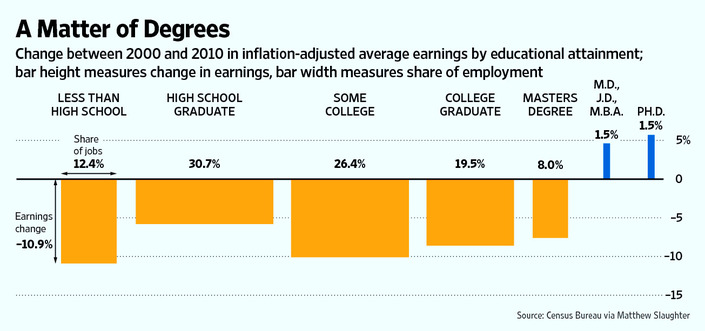Americans have more than enough education to fill 21st Century jobs.
 Saturday, October 1, 2011 at 12:13PM
Saturday, October 1, 2011 at 12:13PM It is frequently asserted that Americans are unemployed and have declining wages because they are undereducated, but that's very hard to square with these data from US Census Bureau (via Mathew Slaughter, via David Wessel at WSJ, via John Schmitt). In the first decade of the 21st Century, real wages of the 31% of the work force that have high school diplomas declined less than the 54% that have some college, bachelor's degrees, or even master's degrees. Only the 3% with Ph.D.s or professional degrees had real wage gains.

Schmitt's excellent point is that a decline in wages is strong evidence against the argument that there has been a shortage of workers with BAs and MAs. When there have been such shortages in the past, wage levels have risen, but not so in the 21st Century. As I've written before, we can't fix this by increasing the number of people that have higher education—in fact, adding to that existing oversupply will depress their wages further, which is the actual objective of some. Nor can we fix the problem by doubling or tripling the number of people who get Ph.D.s and professional degrees—there is no plausible prospect that all of them could find appropriate employment, and those wages would also be driven into decline by an oversupply.
We hear anecdotes about shortages of recent graduates from American colleges, to fill e.g. software development jobs, but we don't hear that employers are increasing the salary offerings for those positions in order to meet their hiring goals. Instead, US employers are using our lax immigration laws to fill the slots with Indians at wages that are high for India but depress US wage rates. That trend may be accelerated by young Americans avoiding vocations that appear highly exposed to foreign price competition and outsourcing. As I have pointed out, labor shortages in declining industries are to be expected.
There are many good reasons to be concerned about the state of American education and to strive to improve its quality and availability, but we should reject the unsupportable claim that unemployment and/or middle-class wage rates can be significantly improved in the short- or medium-term, or even in the long-term, by putting more people with better educations into the US work force. Our 21st Century problem is a shortage of jobs in America, not a shortage of qualified American workers, and we must find our solutions outside the educational system.
 Skeptic
Skeptic
Wharton professor Peter Cappelli concurs in WSJ Online that employers unfairly blame the education system for their not finding perfectly trained new employees at inflexible wages. Today US employers don't want to do their own training, and they fill as few as 10% of vacancies by promoting from within, compared with 2/3 via promotion a generation ago.
 Skeptic
Skeptic
John Schmitt and two EPI colleagues have recently published a report that tests several variations of the hypothesis that advancing technology is responsible for polarization of US wage rates. The hypotheses are not supported by the data from the last three decades. Dean Baker discusses the report here and says we should understand this policy implication:
The big difference between the items listed above and the technology/occupation story is that this is a list of items that involve policy changes. If this list (which could be extended) explains the growth in inequality over the last three decades then it means that inequality was a result of policy. It was not something that just happened; it was something that we did or was done to us.
That presents a very different policy agenda for addressing inequality. No one would quarrel with the idea that our children should get a better education, but if a lack of skills was not the cause of inequality then more skills will not be the solution. Rather we might look at an agenda that would rein in finance and CEO pay, restore the strength of labor unions, and include a more balanced trade policy.


Reader Comments